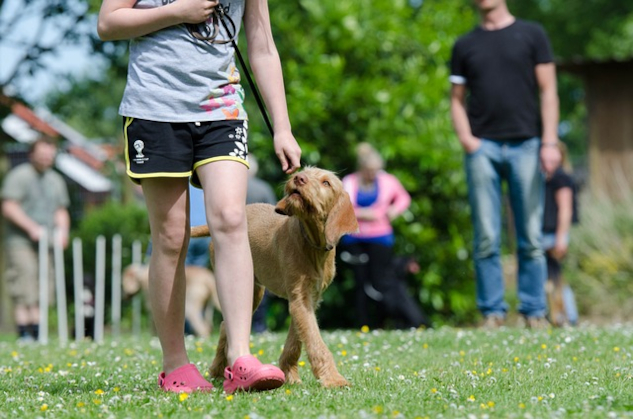
Image from Pixabay
In This Article:
- What your pet’s behavior is telling you about your own energy and emotions.
- Learn to manage on-leash reactivity by addressing your own feelings of safety and control.
- Explore practices to become more grounded and present for your pet.
- Understand how letting go of victimhood can improve your relationship with your pet.
- Practical insights for transforming your energy and your pet’s behavior.
Pet Behavior and You: What Your Dog Is Telling You About You
by Denise Mange.
Any time you experience challenging on-leash behavior, or you or your pet suffer from any physical symptoms affecting the feet, spine, or adrenals, it is an opportunity to examine matters of safety, security, grounding, and victimhood (first chakra).
Consider how these themes may be playing out in your life with your pet or, more broadly, in relationships, your career, or other pursuits. Once addressed, you may find quicker resolution to the behavioral or physical manifestations you are experiencing with your pet.
Let’s explore some of the major motivations and themes that resonate within broader aspects of our lives associated with on-leash reactivity and how these energetic components contribute to our pet’s behavior.
Where do you feel unsafe or insecure?
How do you react to fear and lack of control?
Where could you be more grounded and present in your life?
Where can you let go of victimhood?
In what areas of your life do you feel unsafe or insecure?
Given that lashing out or shutting down on leash is a direct response to feeling unsafe, our pet’s behavior draws attention to areas where we may not feel safe, secure, or in control. Safety isn't limited to managing our pet's behavior; it's a comprehensive concept that extends to our career, relationships, and well-being.
On-leash reactivity is our pet expressing that they need us to anchor the energy of safety and security for them, which means we need to anchor it for ourselves first. However, odds are, we may find ourselves just as lacking as they are in that department. Whether we feel like we don’t quite have our footing because we are between jobs, are feeling insecure in our romantic relationship, are experiencing a physical issue, or even coming to the end of a lease, these life events may be creating more unsafe, insecure energy than we realize.
Practical Insight: Realize that the feeling of safety and security is a multifaceted element that influences every aspect of your life, from relationships to job security. By focusing on feeling safe and secure in another area of your life, you can parlay that energy to address not only on-leash reactivity but also broader life challenges of your own.
How do you react to fear and lack of control?
To walk securely in the world, we must move beyond viewing it as a perilous place and find ways to ground ourselves in feelings of safety. Just like our pets when they face an unexpected trigger, like a skateboard across the street or another dog rounding a corner, we can misconstrue something unexpected to be a severe threat.
When stuck in a disempowering mindset, we may perceive something minor as an existential threat, leading to anxiety and exacerbated reactions to triggers. A big challenge with shifting on-leash reactions is that we cannot control or predict the triggers around us. But when we feel confident to face our fears, we can be more mindful of our reactions.
Practical Insight: To manage on-leash reactivity, reflect on your own need for control in various life scenarios. Consider where else you feel or have felt that you must fight for your survival. How did you react in that situation? Was the need to fight real or rooted in perceptions shaped by past experiences or limiting mindsets?
When you're making your way in the world, do you feel safe and protected or do you view the world as dangerous and threatening? Do you freeze, take flight, or fight when uncomfortable or fearful? Ground into new protocols to find your footing. Recognize that the world is inherently unpredictable, and by mastering your reactions to the unpredictable, you'll not only improve your pet's behavior but also develop resilience and confidence that applies to every aspect of your life.
Where could you be more grounded and present in your life?
It is difficult to project confidence and protection to others, including our animal companions, if we are not present and grounded. If we are multi-tasking, distracted, or our energy scattered, our pets will not trust that we are aware and present enough to protect them when they feel in danger, making on-leash reactivity challenging to address. Even simple habits like taking a few deep, grounding breaths will help center us so we can project focus and self-reliance to our furry friends.
Practical Insight: Establish simple daily practices that enhance groundedness and presence in your life. Begin your mornings with mindfulness to set a centered tone. Embrace moments of digital detox by unplugging from your devices at specific times, allowing you to engage fully with your pet, loved ones, or personal activities. These practices enrich your ability to be present and strengthen your bond with your furry companion.
Where can you let go of victimhood?
Embracing victimhood is a strategy often subconsciously employed to appear non-threatening and stay safe energetically. When in this mindset, we project vulnerability and insecurity and tend to expect the worst.
A victim mentality can hinder our ability to protect and support our pets when they need it most. When we fall into this mindset, we view the world as a dangerous and uncontrollable place where we are a target, similar to how our pets perceive the environment when dealing with on-leash reactivity. Our insecure energy makes our pets feel like they have to fend for themselves, and the behavior that follows is often reactive, assuming the mindset that “offense is the best defense.”
As we work with our animal companions, our pet will require us to embody an energy that is confident, protective, and reassuring, which compels us to be commanding, present, and significant. When embracing this empowering mindset, we signal to our animal companions that we are strong enough to take care not only of ourselves and our energy but of them as well.
Practical Insight: Perceiving yourself as a victim can limit your ability to provide protection and support to your pet and navigate your life confidently. Leverage mantras and be cognizant of using confident body language to shift your energy from victimhood to empowerment, both for your benefit and your pet's well-being. This transformation can help both you and your pet overcome on-leash reactivity.
Copyright 2024. All Rights Reserved.
Adapted with permission.
Article Source:
BOOK: Translating Your Pet's Behavior
Translating Your Pet's Behavior: A Mindful Approach to Dog Training
by Denise Mange. After working with hundreds of clients, certified dog trainer and animal communicator Denise Mange developed a proven methodology revealing the ways our actions, beliefs, and patterns affect our pets to help you create lasting change and powerful transformation not only in your dog’s behavior but in your own life as well.
After working with hundreds of clients, certified dog trainer and animal communicator Denise Mange developed a proven methodology revealing the ways our actions, beliefs, and patterns affect our pets to help you create lasting change and powerful transformation not only in your dog’s behavior but in your own life as well.
This comprehensive resource is perfect for puppy training, helping rescue dogs adapt to a new home, providing comfort for senior pets, or simply engaging long-time companions in new ways.
For more info and/or to order this book, click here. Also available as a Kindle edition.
About the Author
 Denise Mange is a certified dog trainer, animal communicator, pet numerologist, and founder of Pet Prana®. Her mindful approach to pet training combines traditional training with energetic considerations of pet guardianship. She has been featured in publications and media outlets worldwide, cementing her reputation as a pioneer in the field of mindful pet training. Her new book, Translating Your Pet’s Behavior: Learn What Their Behavior Says About You to Train Smarter, Not Harder, is a #1 bestseller in its category on Amazon. Learn more at PetPrana.com.
Denise Mange is a certified dog trainer, animal communicator, pet numerologist, and founder of Pet Prana®. Her mindful approach to pet training combines traditional training with energetic considerations of pet guardianship. She has been featured in publications and media outlets worldwide, cementing her reputation as a pioneer in the field of mindful pet training. Her new book, Translating Your Pet’s Behavior: Learn What Their Behavior Says About You to Train Smarter, Not Harder, is a #1 bestseller in its category on Amazon. Learn more at PetPrana.com.
Article Recap:
This article delves into the deep connection between your pet’s behavior and your own energy and emotions. It focuses on how managing challenging behaviors, such as on-leash reactivity, can reveal broader aspects of your life that may need attention, like feelings of safety, control, and grounding. By addressing these areas in your life, you can create a more balanced and harmonious relationship with your pet, leading to better behavior and a stronger bond.



























